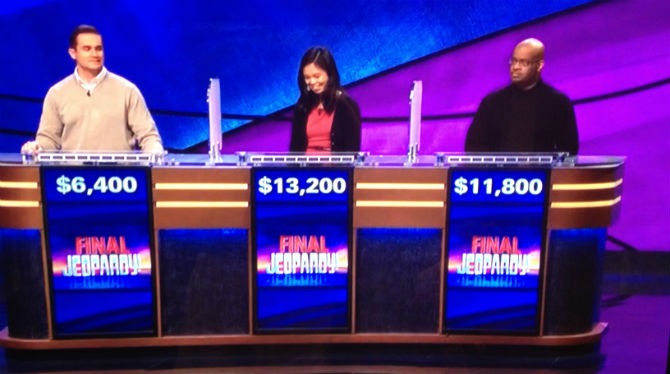Wagering on Final Jeopardy
26 March 2014

I'm not sure if it was the handfuls upon handfuls of advanced math I took in college, but looking at the picture above, it seems quite easy to tell what people should wager. Here's how it should have gone down:
Person on left: Should wager $6,400 or $0. He can't overtake the leader, but basically need to cover the guy on the right. A lower wager could still win it, but you're on Jeopardy, assuming you will get the answer right and would like to take home a big payday if you're the only one with a correct answer. The only other thing to consider, based on your familiarity with the subject is to wager $0. You know the top two people are going to be fighting it out, and you might have an outside shot that they both wagered enough and got the question wrong to bump you to the top.
Person in middle: Should wager $10,401. This will ensure a victory with a correct answer over person on right (easiest to compute).
Person on right: Should wager $1,401. You have to understand that you can't overtake the leader if they get a correct answer, and they need to wager enough to overtake the lead and not worry about the last place person jumping them.
Here's what actually happened (in order they announce them):
Person on left: Wagered $6,400 and got the question wrong, finished with $0.
Person on right: Wagered $11,800 and got the question wrong, finished with $0.
Person in middle: Wagered $10,401 and got the question wrong, finished with $2,799 and won.
Christi gets tired of me saying it every other night, but if these people would take some time to think about their wagers, or take my class, there would be a lot of different winners. In the case last night, Person on right should have won EASILY since everyone got the question wrong. It's amazing that these people have such extreme vast knowledge to compete on a show like Jeopardy, but lack the common sense when it matters the most.